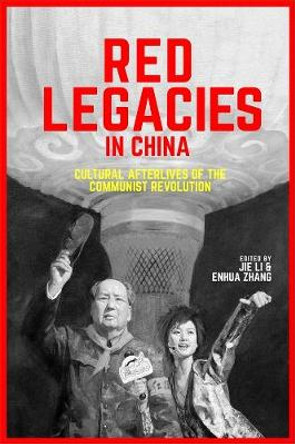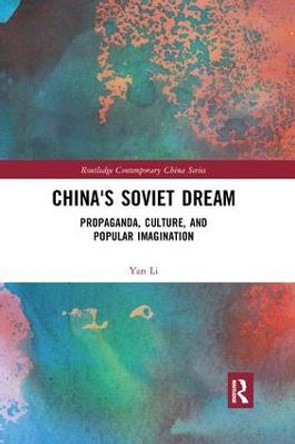Description
Cinematic Guerrillas is a media history of Chinese film exhibition and reception that offers fresh insights into the powers and limits of propaganda. Drawing on a wealth of archives, memoirs, interviews, and ethnographic fieldwork, Jie Li examines the media networks and environments, discourses and practices, experiences and memories of film projectionists and their grassroots audiences from the 1940s to the 1980s. She considers the ideology and practice of "cinematic guerrillas"-at once denoting onscreen militants, off-the-grid movie teams, and unruly moviegoers-bridging Maoist iconography, the experiences of projectionists, and popular participation and resistance. Li reconceptualizes socialist media practices as "revolutionary spirit mediumship" that aimed to turn audiences into congregations, contribute to the Mao cult, convert skeptics of revolutionary miracles, and exorcize class enemies.
Cinematic Guerrillas considers cinema's meanings for revolution and nation building; successive generations of projectionists; workers, peasants, and soldiers; women and ethnic minorities; and national leaders, local cadres, and cultural censors. By reading diverse, vivid, and often surprising accounts of moviegoing, Li excavates Chinese media theories that provide a critical new perspective on world cinema.
About the Author
Jie Li is professor of East Asian languages and civilizations at Harvard University. Her books include Shanghai Homes: Palimpsests of Private Life (Columbia, 2014), Red Legacies in China: Cultural Afterlives of the Communist Revolution (2016), and Utopian Ruins: A Memorial Museum of the Mao Era (2020).
Reviews
In this groundbreaking book, Jie Li delivers a fascinating account of socialist cinema. Reviving the scene of mobile projection and reception, Li reveals the human as central to technology, infrastructure, and energy. By taking propaganda history seriously, Li makes a major contribution to global media theory and archaeology. Cinematic Guerrillas will reverberate across multiple fields in the years to come. -- Weihong Bao, author of Fiery Cinema: The Emergence of an Affective Medium in China
Cinematic Guerillas is both a bumper research harvest and a thrilling read. The memories of Mao-era mobile projectionists and audiences make us understand and feel how the cinema enchanted its audiences with revolutionary spirit-and how it made them willing to pay the heavy price of utopian dreams. -- Chris Berry, coeditor of Chinese Film Festivals: Sites of Translation
Cinematic Guerrillas offers an ingenious exploration of Mao-era China. Jie Li considers state messages conveyed in film, embedding them in a physical mediascape of itinerant projectionists who hauled equipment, cash-strapped collectives who paid for local screenings, and villagers who flocked to open-air showings for entertainment and respite. Perceptive, hilarious, and heartbreaking. -- Gail Hershatter, author of The Gender of Memory: Rural Women and China's Collective Past
How do you turn a scattered population into a revolutionary mass? Drawing on extensive archival and oral research, Li depicts the work of thousands of mobile projectionists traveling all over China training rural peoples for political struggle. A tour de force of historical reconstruction and theoretical intervention, this book shows how the Chinese revolution was also a media revolution dependent on the logistical work of 'cinematic guerillas.' -- Brian Larkin, author of Signal and Noise: Infrastructure, Media, and Urban Culture in Nigeria
Cinematic Guerrillas is cultural history at its best. Not only does it provide an engaging account of the culture of the young and aspiring PRC, but it also lays out an impeccable method to study socialist culture, straddling media studies and political economy to critically analyze some fundamental features of its very effective propaganda. -- Laikwan Pang, author of The Art of Cloning: Creative Production During China's Cultural Revolution
Jie Li's research on Maoist cinema as a spirit medium reveals the constant struggle to keep revolutionary enthusiasm high after the People's Republic of China was established in 1949. Her research on mobile projectionists brings out the complexity of working with rural audiences who sought the entertainment value in films meant to be understood ideologically. This book is a fine contribution to the study of cinema under socialism. -- Wendy Larson, author of Zhang Yimou: Globalization and the Subject of Culture
Through its marvelous narrative, Cinematic Guerrillas makes a compelling case that reception constitutes the core of cinema's function and value . . . What Li manages to both uncover and produce is a rich and richly contradictory history of Chinese cinema, or, more precisely, of cinema in China, detailing in its intricacies how projectionists and audiences became key conduits of the "media revolution" that others might more commonly call the "Chinese revolution." -- Bruno Guarana * Film Quarterly *
Book Information
ISBN 9780231206273
Author Jie Li
Format Paperback
Page Count 360
Imprint Columbia University Press
Publisher Columbia University Press







